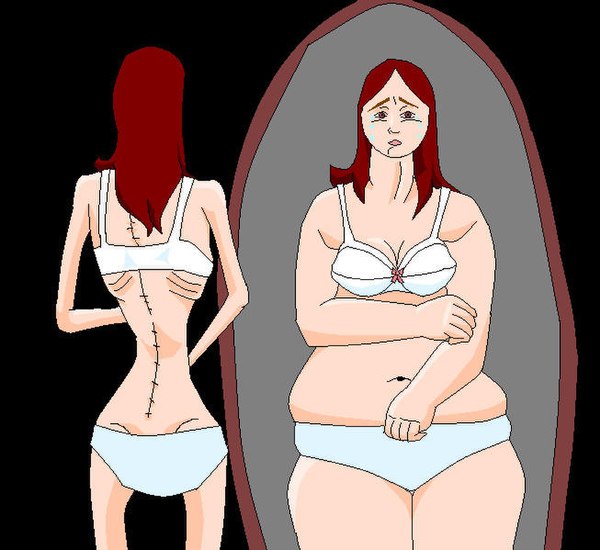Anorexia nervosa
Eating disorders such as anorexia nervosa, and bulimia are serious and sometimes fatal illnesses that cause severe disturbances to a person’s eating behaviors. Obsessions with food, body weight, and shape may also signal an eating disorder.
Anorexia
Anorexia Nervosa is a serious mental health disorder characterized by an irrational fear of weight gain and a distorted body image that leads to severe weight loss. It is primarily diagnosed in adolescent girls and young women, although it can affect individuals of any age, gender, or cultural background.
Cause
Anorexia Nervosa is a complex condition that involves a range of physical, psychological, and social factors. The underlying causes of anorexia are not well understood, but are thought to include a combination of genetic, biological, and environmental factors.
Symptoms
Physical symptoms of anorexia nervosa include significant weight loss, malnutrition, and electrolyte imbalances, as well as a range of other health problems, such as anemia, amenorrhea, and osteoporosis. These physical symptoms can be life-threatening and require immediate medical attention.
Significant genetic correlations based on the SNP risk loci of Anorexia nervosa with psychiatric and
Psychological impact
Psychologically, individuals with anorexia nervosa may experience low self-esteem, negative body image, and perfectionism. They may also experience anxiety and depression, and may engage in avoidance behaviors and compulsive exercise.
Treatment
Treatment for anorexia nervosa typically involves a combination of psychological and medical interventions, such as therapy, medication, and nutritional rehabilitation. Cognitive behavioral therapy (CBT) has been shown to be effective in treating anorexia nervosa, as it helps individuals to challenge negative thoughts and behaviors related to their body image and eating habits. Family therapy can also be an important component of treatment, as anorexia nervosa often affects not only the individual but also their family and loved ones.
Frequently asked questions
- Here are some of the most commonly asked questions on anorexia nervosa.
- Why are people with anorexia nervosa obsessed with their weight?
- People with anorexia nervosa may see themselves as overweight, even when they are dangerously underweight. People with anorexia nervosa typically weigh themselves repeatedly, severely restrict the amount of food they eat, and eat very small quantities of only certain foods.
- Is anorexia nervosa serious?
- Yes. Anorexia nervosa has the highest mortality rate of any mental disorder.
- What are the different types of anorexia?
- There are two subtypes of anorexia nervosa: a restrictive subtype and binge-purge subtype. Restrictive: People with the restrictive subtype of anorexia nervosa place severe restrictions on the amount and type of food they consume. Binge-Purge: People with the binge-purge subtype of anorexia nervosa also place severe restrictions on the amount and type of food they consume. In addition, they may have binge eating and purging behaviors (such as vomiting, use of laxatives and diuretics, etc.).
- What causes the mortality related to anorexia nervosa?
- While many young women and men with this disorder die from complications associated with starvation, others die of suicide. In women, suicide is much more common in those with anorexia than with most other mental disorders.
Symptom - faqs
- What are the symptoms of anorexia nervosa?
- Extremely restricted eating
- Extreme thinness (called emaciation)
- A relentless pursuit of thinness and unwillingness to maintain a normal or healthy weight
- Intense fear of gaining weight
- Distorted body image, a self-esteem that is heavily influenced by perceptions of body weight and shape, or a denial of the seriousness of low body weight
Other symptoms may develop over time, including:
- Thinning of the bones (osteopenia or osteoporosis)
- Mild anemia and muscle wasting and weakness
- Brittle hair and brittle nails
- Dry and yellowish skin
- Growth of fine hair all over the body (lanugo)
- Severe constipation
- Low blood pressure, slowed breathing and pulse
- Damage to the structure and function of the heart
- Brain damage
- Multiorgan failure
- Drop in internal body temperature, causing a person to feel cold all the time
- Lethargy, sluggishness, or feeling tired all the time
- Infertility
Diagnosis faqs
How do you diagnose anorexia nervosa? Exams and Tests Tests should be done to help find the cause of weight loss, or see what damage the weight loss has caused. Many of these tests will be repeated over time to monitor the person. These tests may include:
- Some of the tests include CBC
- Liver function test and kidney function tests
- Thyroid function studies
- EKG
- EEG
- Urinalysis
- Bone density
- Albumin
Treatment faqs
How is anorexia nervosa treated? It is important to seek treatment early for eating disorders. People with eating disorders are at higher risk for suicide and medical complications. Some people with eating disorders may also have other mental disorders (such as depression or anxiety) or problems with substance use. Treatment plans for eating disorders include psychotherapy, medical care and monitoring, nutritional counseling, medications, or a combination of these approaches. Typical treatment goals include restoring adequate nutrition, bringing weight to a healthy level, reducing excessive exercise, and stopping binge-purge and binge-eating behaviors. Complete recovery is possible. Specific forms of psychotherapy (or “talk therapy”) and cognitive behavioral approaches can be effective for treating specific eating disorders.
How can W8MD help?
Pronounced weightMD, our state of the art W8MD physician medical weight loss, sleep, holistic IV nutrition and aesthetic medicine programs can help you not only to lose weight, and sleep better but also look your best! The Center’s team of practitioners are among the most qualified, dedicated and hospitable professionals in the industry.
Also see
References
- American Psychiatric Association. (2013). Diagnostic and Statistical Manual of Mental Disorders, 5th Edition (DSM-5).
- National Eating Disorders Association. (2021). Anorexia Nervosa.
- National Institute of Mental Health. (2021). Anorexia Nervosa.
- National Health Service. (2021). Anorexia Nervosa.
- Smith, M. & Thelen, M. (2020). Eating Disorders in Children and Adolescents. Pediatrics in Review, 41(7), 391-399.
W8MD Weight Loss, Sleep & Medspa Centers
W8MD Weight Loss, Sleep & Medspa Centers is a network of medical centers located in New York, Pennsylvania, New Jersey and surrounding areas that provide comprehensive care for weight loss, sleep disorders, and aesthetic treatments.
Book appointments
Locations
W8MD location(s):
- Brooklyn, NY: NYC medical weight loss, sleep and medspa: 2632 E 21st St., Suite L3, Brooklyn, NY 11235 Contact: (718)946-5500
- W8MD Weight Loss, Sleep - Philadelphia - 1718 Welsh Road, 2nd Floor, Ste C, Philadelphia, PA 19115 (215)676-2334
- W8MD's Weight loss diet - Recipes (WikiMD)
- Links: Weight loss | Sleep medicine | Medical spa | Nutrition | Success stories |
- Diet pills: Phentermine, Phen/Topiramate, Wegovy, Saxenda, Zepbound, Mounjaro, Contrave, Diethylpropion etc.
- Resources: W8MD diet | Keto diet guide | Free Ebook | 12 Ways to lose weight quickly | 8 Amazing Weeks
Also see
This is a short summary article. For quality control, we do not encourage or allow strangers to edit the content.






